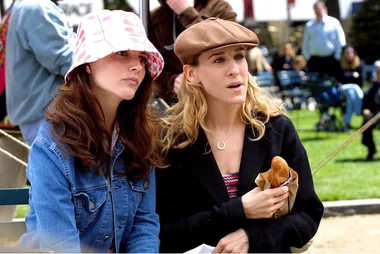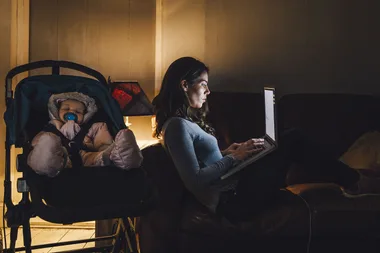In news that will surprise literally no one, an annual study has found that men are carrying out the same amount of domestic labour duties as they were 20 years ago.
Published by the Household, Income and Labour Dynamics in Australia (Hilda), the findings are the culmination of a long-term survey that’s been following the daily habits of more than 17,000 Australians since 2001.
The latest report paints a picture of a largely unchanged domestic load for men, with data revealing they spend an average of 12.8 hours on housework per week, which remains exactly the same as it was in 2002.
Their female counterparts however almost double that amount, with Australian women clocking in an average of 18.4 hours of housework per week.
Grocery shopping, food preparation, laundry, grounds care and gardening, home and vehicle maintenance, caregiving (for children and adults) and paying bills were all considered as domestic labour within the study.
Despite the glaring disparity, both women and men are employed in longer hours of paid work than they were 20 years ago. However, while the average hours of weekly employment for men only rose from 37.7 hours (in 2002) to 37.9 hours (in 2022), women in 2022 averaged 28.5 – up from 22.2 hours two decades prior.
While women are still doing more housework, they’re also taking on the majority of caring duties in homes with children, accounting for an average of 10.7 hours a week compared to men’s 5.5 hours.
The Baby (Un)Balance
The findings also revealed that as soon as children are involved, the amount of time spent on both paid and unpaid work increases significantly. Couples without children accounted for an average of 108 hours per week across the domestic and employment spheres, whereas the figure for parents was closer to 144 hours per week.
A noticeable shift in responsibility was also apparent in the HILDA data, showing a significant widening of the domestic labour gap once a couple’s first baby was born. Five years prior, the share of paid and unpaid work between couples is almost equal – with men leaning slightly higher on the employment front (53 per cent) and women taking on 54 per cent of the housework.
We know that pregnancy and childrearing have a huge impact on household dynamics and the study confirms this unbalance. In the first year after a baby is born, the average share of care for the mother rises to 71 per cent, with her housework load skyrocketing to 63 per cent.
“The birth of the first child is a turning point in a couple’s division of labour, and it has a long-lasting impact,” says Dr Inga Lass, Senior Research Fellow at the Melbourne Institute: Applied Economic & Social Research, at the University of Melbourne..
“Women usually go on maternity leave and become responsible for much of the childcare and housework.” A status quo that, when combined with men continuing on with their jobs as normal, or even increasing hours, can be hard to break.
But even when women return to work after having children, there’s rarely a rebalancing of the pre-baby scales.
“If a woman returns to the labour market, she still keeps doing much of what she has been doing at home as well. Most of those tasks still fall on her shoulders. It becomes a pattern that isn’t renegotiated,” says Dr Lass
Domestic Labour & The Male Blind Spot

She asked him to vacuum, he said he’d “do it later.” She’s still waiting. It’s the housework battle brewing in most Aussie homes and while women report feeling overwhelmed by their never-ending to-do list, men are patting themselves on the back.
We know that men and women don’t always see eye-to-eye, and when it comes to our perceptions of who does the majority of the household chores, it would appear our perspectives couldn’t be further apart.
It might not come as a surprise that the research found that there’s not only a disparity in the amount of unpaid domestic labour being done by men and women, but in our perceptions of how much is being done as well.
The majority of men surveyed as part of the report believed they did their fair share of housework and domestic labour tasks, with 58 per cent of childless men and 55.6 per cent male parents, agreeing with the sentiment.
“The perceptions of men and women as to whether they do or don’t do their fair share are diverse.
“In the same couple, women feel overly burdened and men think they are doing enough at home – they don’t see a problem,” says Dr Lass.
Considering these statistics, it’s no surprise that women were found to be more dissatisfied that men with the division of household labour. The study found that the majority of women (62,6 per cent) felt unsatisfied with the burdensome balance and resented the disparity, whereas only 17 per cent of men said the same.
While we know that women—whether in full-time employment or not—do more unpaid domestic labour than men, this study reveals a deeper problem with the way male partners are thinking about the division of household chores, leading to a toxic hangover for many relationships.
If resentment could clean the house, Australian women would be living in spotless mansions.
Related articles:
- Couples Who Split Housework Have Better Sex
- Kids Who Are Forced To Do Chores Turn Out To Be More Successful Adults
- This Is What Women Want (And Need) At Work



